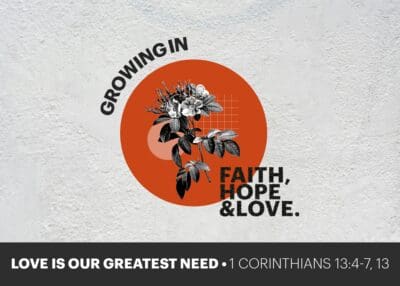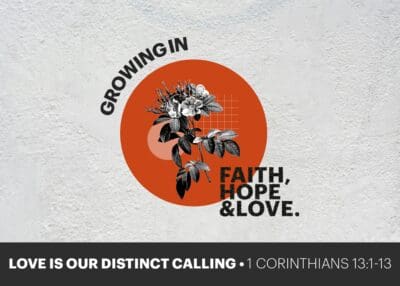John answered, “A person cannot receive even one thing unless it is given him from heaven.” (John 3:27)
We are going to look at some words of John the Baptist, the man who was given the great privilege of announcing the coming of Jesus. John had attracted great crowd through his preaching in the desert. His message was simple: “Something that has never happened in the history of the world before is about to take place. God is coming near! You are going to meet with God! Make straight the way of the Lord” (John 1:23).
Many people felt that if they were going to meet with God they had better get ready, and that led them to confess their sins and to be baptized as a sign of their repentance.
Then John spoke to them about Jesus: He is “the Lamb of God who takes away the sin of the world” (John 1:29). He is the one who “baptizes with the Holy Spirit” (John 1:33). He is able to fill your life with the power and presence of God.
I want you to notice John’s next words: “A person cannot receive even one thing unless it is given him from heaven” (John 3:27). In these verses there are four marvelous gifts that Jesus Christ, who came from heaven, is ready to give to all who will receive them:
- Purity: What makes a person clean? Now a discussion arose between some of John’s disciples and a Jew over purification (3:25).
- Peace: What brings a person peace? All are going to him (3:26).
- Love: How can a person love? The one who has the bride is the bridegroom (3:29).
- Joy: What gives a person joy? Therefore this joy of mine is now complete (3:29).
What is so striking to me is that religion often seems to be marked by the opposite of these. Religion is often marked by hypocrisy rather than purity, anger rather than peace, indifference rather than love, and misery rather than joy. What I want to draw your attention to is that here we have something quite different – joy, humility, purity, and love!
Where do these come from? How do we get them? The answer is: Jesus Christ. If we have him, we will have these four marvelous gifts of purity, peace, love and joy. Jesus is the source of these gifts and the one who holds them together.
Purity: What Makes a Person Clean?
A discussion arose between some of John’s disciples and a Jew over purification. (John 3:25)
It is easy to see how this discussion arose. John had been baptizing people by immersing them in water, which is a symbol of being washed or cleansed. That raised the question, “What makes a person clean?”
The discussion arose between some of John’s disciples and a Jew, who would have practiced a whole series of ritual washings. What makes a person clean before God? Do you get clean by being baptized? If your parents brought you to be baptized when you were a baby, does that make you clean? What if you were baptized as a teenager or as an adult?
Or do you get clean by pursuing certain rituals as the pattern of your life? And if so, which ones? Does going to church make you clean? Receiving communion? Or making a confession? Saying prayers? Serving the poor?
So here are two approaches to getting clean that are still common today. Is it being baptized – something that happens once? Or is it by an ongoing pattern that you pursue, weaving certain rituals into your life?
It seems that John stepped into this dispute and his answer was ‘Neither!’ Being baptized doesn’t make you pure, nor does any religious ritual, however scrupulously observed. So what makes a person clean? John answered, “A person cannot receive even one thing unless it is given him from heaven” (John 3:27).
Purity is a gift, and it comes from heaven! It comes from Jesus Christ, who came from heaven, so that this gift should be yours. John says, “I can’t give this gift to you, because I am not the Christ” (3:28). You can’t give this gift to yourself either. Purity is a gift that must be received. That is good news! Thank God purity is a gift, and it comes from Jesus Christ.
In our culture people sometimes think of purity as something that you are born with and that you lose if you mess up. But in the Bible it is the other way round. None of us is born with purity. We are born sinners. That is our nature.
Purity is not something we have until it is lost. It is something that we are without until we receive it! And Jesus Christ came into the world so that this gift of being washed, cleansed, and made pure should be yours.
“A person cannot receive even one thing unless it is given him from heaven” (3:27), and that includes the gift of purity.
Peace: What Brings a Person Peace?
They came to John and said…“Rabbi, he who was with you across the Jordan, to whom you bore witness—look, he is baptizing, and all are going to him.” (John 3:26)
John the Baptist had been the man of the moment. Vast crowds had come to him in the desert, and he was used by God to lead a remarkable movement of spiritual renewal. If Time magazine had been around back then, John the Baptist would have been a contender for “Person of the Year.”
The ministry of John was to point people to Jesus, so when Jesus began his public ministry, the crowds that had flocked to John immediately left him and began to follow Jesus.
John’s ministry was in decline, and for some of his disciples this was a problem. All of us know what that’s like. We experience it in all kinds of ways. Great joy is yours because you are doing something well, but then someone else comes along and he or she does it better.
Your career seemed to be going somewhere but it flattened out, and then it seemed to tail off. You found an opportunity but then others came along and were more successful at exploiting it than you were. You were praised for your success at school or in sports, but now, just a few years later, the spotlight has moved and no one is cheering for you anymore.
How is it for you when others are doing better than you are? How is it when what is happening for you is less than it was before? The disciples of John were in this position and they did not handle it well. “Rabbi, he who was with you across the Jordan, to whom you bore witness—look, he is baptizing, and all are going to him” (3:26).
There is resentment there. There is envy there. There is self-pity there, and maybe even some anger there. But you don’t see any of that in John. John is at peace. He explains why in these words to his disciples, “A person cannot receive even one thing unless it is given him from heaven” (3:27).
The secret to freedom from resentment, jealousy, and self-pity is to see that someone else’s success is given to him or her by God, and to accept with gratitude and joy what God has given to you.
John has peace. And the reason he has peace is that he accepts and finds joy in what God has given to him. You see this in the words John speaks about being the ‘friend of the bridegroom’: “The one who has the bride is the bridegroom. The friend of the bridegroom, who stands and hears him, rejoices greatly at the bridegroom’s voice” (3:29).
The friend of the bridegroom (we would say ‘the best man’) played a really significant role in a Judean wedding. In that culture, the best man was, first of all, responsible for sending out the invitations! He was the one who had to make sure that the bride was ready for the arrival of the bridegroom. Some of you will be thinking, If the best man at our wedding had been responsible for sending out invitations, we would never have got married!
John says, “I am the friend of the bridegroom. I am not the Christ. I am not the bridegroom.
And that means it is not about me. The bride does not belong to me. The bride belongs to the bridegroom.”
This is a good word for all of us. As Christian believers we are friends of the bridegroom. Our job is never to make much of ourselves. Our job is to send out the invitations. Our ministry is to introduce people to him. We don’t want this to be about ourselves.
“The one who has the bride is the bridegroom” (3:29). John spoke more than he knew when he described Jesus as “the bridegroom.” God had already spoken of his people in the Old Testament as his bride, but what John did not know is that in the New Testament, God would speak of the church as “the bride of Christ.”
“The one who has the bride is the bridegroom” (3:29). Jesus Christ is the One who has the bride. The church does not belong to us. It belongs to him. The goal of our ministry is not that the bride should love us, but that the bride should love Jesus Christ who is the bridegroom.
“The one who has the bride is the bridegroom” (3:29). It is not that the church has Jesus (though that is wonderfully true). Jesus has the church, and that is an even greater truth. Jesus said, “I will build my church and the gates of hell will not prevail against it” (Mat. 16:18). That’s why the church has a great future on earth and in heaven, because the church is the bride of Christ and “the one who has the bride is the bridegroom.”
Love: How Can a Person Love?
The one who has the bride is the bridegroom. (John 3:29)
Every analogy is given to communicate a particular truth. Here’s how you should think of Jesus Christ: He has set his love upon you. He is deeply committed to you, and he is actively engaged in seeking to draw you to himself.
Now what analogy would help us to picture that? I come from the North of Scotland. My wife Karen comes from the south of England, and in the kindness of God, we met when we both became students at the same college in London. I spotted her on the very first weekend we arrived, and for the next two years set about winning her heart.
Here is something that all of us can understand, and John is telling us that this is how we should think about Jesus Christ. Christ has set his love on you. He is actively engaged in winning your confidence and your trust. He does this by making himself know to you, and showing the love that he has for you.
Q: How can a person love?
A: Love is the natural response to knowing that you are loved.
Loving Christ is the free and glad and spontaneous response of a person who has come to see and to know that Jesus Christ truly loves us. When you see how much Christ loves you, you will love him more. And if, today, you do not yet love him, you have not yet seen how much he loves you, remember, the Bible says, “We love because he first loved us” (1 John 4:19)!
My prayer for this series is that you will meet Jesus and, in discovering his great love for you, you will come to know and love him. The picture of the bridegroom tells us not only that Christ loves us, but that when he wins our hearts our whole lives will be transformed through our union with him.
Christ loves you, and who loves you makes all the difference in the world. He is God in the flesh. All that belongs to God is his. And when we become his, all that is his becomes ours. This is absolutely staggering.
Picture a woman who is destitute. She has made some poor choices and run up debts that she cannot pay. She is alone in the world. No one cares for her.
One day she meets a man who takes an interest in her. The dysfunction of her life makes her back off. But eventually the man wins her heart, and after some time, he asks for her hand in marriage.
What her life will be, if she accepts his proposal, depends entirely on who this man is. If he also has debts, her position will be worse after marriage than it was before. If he brings all kinds of baggage into the marriage and adds it to hers, the new couple are really going to struggle.
But suppose for a moment that this man is a king. Suppose he is a good king. Suppose he is a noble king. The moment they are married, all of this girl’s debts are absorbed by the king and paid off by him.
When this destitute woman is married to the king, she becomes the queen. She has no royal blood in her. She was not born to this, but the moment she is married to the king, all the privileges of royalty become hers, because she has become his!
You may say, “That sounds like a fairy tale! Why would any king be interested in a destitute woman?” This is the amazing truth of the gospel: The Son of God, in all his glory, loved us and gave himself for us! “Though he was rich, yet for your sake he became poor, so that you by his poverty might become rich” (2 Cor. 8:9).
The greatest love you will ever know in this world is the love of Jesus Christ for you. Any love you have been blessed with in this life is a pointer to this unmeasurable love that Jesus Christ has for you.
Joy: What Gives a Person Joy?
Therefore this joy of mine is now complete. (John 3:29)
This is a remarkable statement. Remember that John was facing a great deal of loss. His ministry was in decline. The crowds that once came were a thing of the past. But this man is completely at peace. He is not disappointed. He is not jealous. He is not resentful, and he is not afraid. He says that his joy is complete!
John finds greater joy in Jesus than in his own success. If your joy is in your own success, your joy will never be complete. There will always be someone else who is doing better than you, and that will inhibit your joy. But John’s joy is in Jesus, and he says, “This joy of mine is now complete!”
A man by the name of Ronald Wallace has said this in a way that I have found helpful: “Joy comes without being cultivated or thought about, to those who allow themselves to become absorbed as John did, in the glory and wonder of… The Christ.” [1]
I love how he says, “without being cultivated.” We live in a world that is in a relentless search for joy and happiness. “What can I do that will make me happy? Where can I go to find real joy?”
How easy it is to spend our lives chasing around trying to find the next thing that we think will give us joy. You don’t get joy by chasing around after joy. You find joy by giving yourself to Jesus. Joy comes, without being cultivated, to those who become absorbed in the glory and wonder of the Christ.
What do you know of purity, peace, love, and joy in your life? These are marvelous gifts and they can be yours. All of them are found in Christ who died and rose to procure them. He holds them in his hands and offers them to you, and the more you know, love, trust, worship, and serve him, the more you will know of purity and peace and love and joy.
[1] Ronald Wallace, The Gospel of John, p. 71, Scottish Academic Press, 1991.





